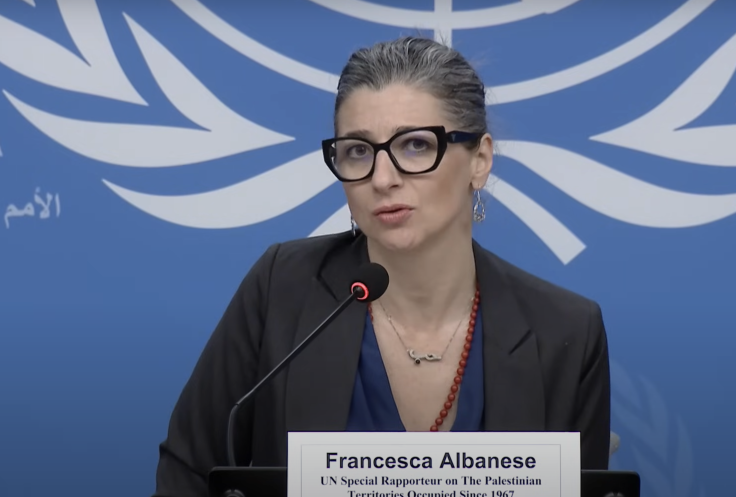The lawsuit directly challenges Francesca Albanese’s diplomatic immunity, potentially opening the door to more defamation suits against the UN official

U.N. Palestinian rights envoy Francesca Albanese was sued in federal court on Monday for waging a “defamatory, derogatory, and hateful” legal campaign against two pro-Israel nonprofit groups, according to a copy of the lawsuit obtained by the Washington Free Beacon. The case has the potential to challenge Albanese’s diplomatic immunity and open the door for further lawsuits.
The Christian Friends of Israeli Communities and Christians for Israel—two U.S.-based nonprofits that work to foster closer ties between American and Israeli communities—allege Albanese, whose formal title is U.N. special rapporteur on the occupied Palestinian territories, “knowingly spread malicious lies” when she threatened them earlier this year with potential “criminal liability” for their work in support of the Jewish state. Both nonprofit groups say Albanese’s lawfare campaign harmed “their reputations and financial wellbeing” and warrant “compensatory and punitive damages.”
The lawsuit stems from a series of “threatening letters” Albanese sent to corporations and nonprofits across the globe over the summer in which she warned organizations to cut business ties with Israel or face legal repercussions. The intimidation campaign drew a private rebuke from the Trump administration in April, which formally petitioned the United Nations to fire Albanese, and played a role in the State Department’s subsequent decision to sanction her for waging an “illegitimate and shameful” anti-Israel crusade.
The first-of-its-kind lawsuit takes aim at Albanese’s diplomatic immunity, which plaintiffs believe the official has abused.
The pro-Israel groups argue Albanese violated the United Nations’ Code of Conduct by spreading “Jew-hatred” in numerous public spaces over the years. Her legal campaign also took place during a time when her role as a special rapporteur had lapsed, meaning her diplomatic immunity had expired as well, plaintiffs allege.
Albanese’s position was up for renewal by the United Nations during the time she issued the legal threats and compiled the July report. The United Nations only voted to reinstall her in April 2025, after the letters had been sent and multiple nations, including the United States, objected to her continued employment.
Albanese’s mandate “legally expired on April 30, 2025 and she held neither official UN status nor any arguable immunity as of May 1, 2025,” the plaintiffs argue. “Though published under the guise of an official UNHRC report, [Albanese’s] appointment as Special Rapporteur had legally expired prior to the Report’s publication in June.”
Should the two nonprofit groups succeed, they could set the stage for other American entities named in Albanese’s report to sue for defamation. The Trump administration’s Justice Department formally warned Albanese of those potential consequences earlier this year, telling the U.N. staffer her legal campaign was “defamatory, dangerous, and a flagrant abuse of [her] office.”
Now, an American court will decide whether that is the case.
“If a racist anti-Semite gains a position of power and proceeds to abuse the public platform she enjoys to perpetuate lies about American religious organizations for their compassion toward and allyship with the Jewish people and the Jewish State of Israel by smearing them as genocide-enablers, and calling for them to be blacklisted and sanctioned, she can and should be held liable for defamation,” Rachel Sebbag, litigation counsel with the National Jewish Advocacy Center—an organization representing the plaintiffs—told the Free Beacon.
Albanese sent both U.S. nonprofits legal letters in late April in which the U.N. official accused them of facilitating “gross violations of human rights, including funding of illegal settlements activities, which constitute a war crime in and of itself.” She intended to put the organizations’ leaders “on notice of a serious risk of being implicated in international crimes,” according to copies of the warning letters included in the lawsuit.
Christians for Israel refuted these claims in a May 19 response to Albanese, asking her to furnish any evidence behind “such astonishing, false accusations,” according to the suit. Albanese never responded to that letter and went on to publish her report, “From economy of occupation to economy of genocide,” the following month.
Albanese also accused both groups of “committing tax fraud by violating regulations governing charitable organizations through their support of Israel” by being “Faith-based charities” that serve as “key financial enablers of illegal projects” in the Jewish state.
Albanese requested the United Nations and international courts blacklist the entities named in her report and begin legal proceedings against them “for their part in the commission of international crimes and laundering of the proceeds from those crimes.”
For Eugene Kontorovich, a professor at George Mason University’s Antonin Scalia Law School, the two nonprofits’ lawsuit is a promising effort to challenge the blanket immunity offered to U.N. officials and organizations.
“Some of the vilest antisemites and terror supporters have sought to shield themselves from accountability for their actions by hiding behind the UN flag. But as [the U.N. Relief and Works Agency for Palestine Refugees in the Near East],” the humanitarian organization linked to Hamas, “recently discovered, automatic immunity for anyone claiming a UN affiliation is over.”
The Trump administration, he added, “has commendably sanctioned Albanese, but the American citizens she has harmed deserve direct justice.”
















